When the reality of what can happen with regards to the tariff program that old Donnie has implemented let’s think it through on one item. Usa sells a lot of their internally produce alcohol, to Canada. So if Canada does what they are allowed to do, stop buying any USA alcohol what so ever. The USA will stop buying Canadian alcohol in retaliation, so at some point in time he USA and Canada will be over producing their products. Until they find new customers, will they have to lay off staff, reduce their cost to the new customers, in an effort to gain new sales. If the whole industry is having to change their business plan, what will happen in the near future? What about the USA auto industry that relies on getting parts over Canadian and Mexico boarders, and they have to shut down their factories, would that make America Great Again?
The Tarriff Hype.
- Thread starter petros
- Start date
You are using an out of date browser. It may not display this or other websites correctly.
You should upgrade or use an alternative browser.
You should upgrade or use an alternative browser.
It’s unclear if Canada’s oil will be exempt from the tariff as Trump told reporters that oil “has nothing to do with it.”
Trump’s tariffs aim to force Canada and Mexico to take serious action against illegal drug smuggling and immigration which occurs at their borders.
Initially, the tariff was to take effect on his first day of office, January 20, but was postponed until February 1, leaving Canadians under two weeks to respond to his demands.
However, because Trudeau prorogued Parliament until March 24, little action has been taken by Canadian politicians to respond to Trump’s threats.
Conservative Party leader Pierre Poilievre has demanded that Trudeau immediately reconvene Parliament on an “emergency” basis so Canada can deal with the looming tariffs.
“Canada is facing a critical challenge. On February 1st we are facing the risk of unjustified 25% tariffs by our largest trading partner that would have damaging consequences across our country,” wrote Poilievre in a news release Tuesday.

Meanwhile, polls have revealed that 77 percent of Canadians want an immediate election to deal with the tariff threat.
(Being tone deaf, Trudeau, who is slated to resign once a new Liberal leader is selected, has told Canadians that Liberals are considering all options, except not suspending Canadian parliament over a Liberal leadership race, including retaliatory tariffs)
News that the tariffs are to take effect also come after Trump has repeatedly suggested that he would like to annex Canada and make the country the “51st state” of America.
While Trump’s comments were initially passed over as a joke or trolling, Trump has persistently referred to Canada as the “51st state” and even threatened to use “economic force” to overtake Canada.
Conservative Party of Canada leader Pierre Poilievre, who is “likelyto become prime minister in the next election, has had choice words for Trump. He has said Canada will “never” become a U.S. “state.”
“We are a great and independent country,” he continued. “We are the best friend to the U.S. We spent billions of dollars and hundreds of lives helping Americans retaliate against Al-Qaeda’s 9/11 attacks.
We supply the U.S. with billions of dollars of high-quality and totally reliable energy well below market prices.
We buy hundreds of billions of dollars of American goods.”
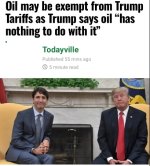
Speaking to reporters in the Oval Office on Thursday evening, Trump told reporters his administration was yet to determine whether oil imports would be included in the policy, noting that the decision was pinned on whether the two nations “treat us properly” and “if the oil is properly priced.” ??? What does properly priced mean?
Mexico and Canada are the United States’ biggest trade partners. In 2020, during his first tenure in office, Trump replaced the three countries’ long-standing North America Free Trade Agreement, or NAFTA, with his United States-Mexico-Canada Agreement, or USMCA, or CUZMA, etc…which was touted at the time as a better deal for American businesses.
Trump’s tariffs aim to force Canada and Mexico to take serious action against illegal drug smuggling and immigration which occurs at their borders.
Initially, the tariff was to take effect on his first day of office, January 20, but was postponed until February 1, leaving Canadians under two weeks to respond to his demands.
However, because Trudeau prorogued Parliament until March 24, little action has been taken by Canadian politicians to respond to Trump’s threats.
Conservative Party leader Pierre Poilievre has demanded that Trudeau immediately reconvene Parliament on an “emergency” basis so Canada can deal with the looming tariffs.
“Canada is facing a critical challenge. On February 1st we are facing the risk of unjustified 25% tariffs by our largest trading partner that would have damaging consequences across our country,” wrote Poilievre in a news release Tuesday.
Meanwhile, polls have revealed that 77 percent of Canadians want an immediate election to deal with the tariff threat.
(Being tone deaf, Trudeau, who is slated to resign once a new Liberal leader is selected, has told Canadians that Liberals are considering all options, except not suspending Canadian parliament over a Liberal leadership race, including retaliatory tariffs)
News that the tariffs are to take effect also come after Trump has repeatedly suggested that he would like to annex Canada and make the country the “51st state” of America.
While Trump’s comments were initially passed over as a joke or trolling, Trump has persistently referred to Canada as the “51st state” and even threatened to use “economic force” to overtake Canada.
Conservative Party of Canada leader Pierre Poilievre, who is “likelyto become prime minister in the next election, has had choice words for Trump. He has said Canada will “never” become a U.S. “state.”
“We are a great and independent country,” he continued. “We are the best friend to the U.S. We spent billions of dollars and hundreds of lives helping Americans retaliate against Al-Qaeda’s 9/11 attacks.
We supply the U.S. with billions of dollars of high-quality and totally reliable energy well below market prices.
We buy hundreds of billions of dollars of American goods.”

Speaking to reporters in the Oval Office on Thursday evening, Trump told reporters his administration was yet to determine whether oil imports would be included in the policy, noting that the decision was pinned on whether the two nations “treat us properly” and “if the oil is properly priced.” ??? What does properly priced mean?
Mexico and Canada are the United States’ biggest trade partners. In 2020, during his first tenure in office, Trump replaced the three countries’ long-standing North America Free Trade Agreement, or NAFTA, with his United States-Mexico-Canada Agreement, or USMCA, or CUZMA, etc…which was touted at the time as a better deal for American businesses.
So here’s a weird one that might seem like background but really isn’t. In 2023, 91 percent of the potash used in the United States was imported from other countries, a slight increase compared to the previous year. Canada was the primary source of potash imports to the U.S. at that time.
(Of the 9%-ish that America produced domestically, 75% of that came from New Mexico)
The global production annually of potash looks like this:
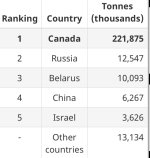

If US President Trump put a 25% tariff on potash, who are American Farmers going to get to replace that with so as not to have to pay the 25% tariff? Whomever is supplying the 11%-ish to America that Canada isn’t?
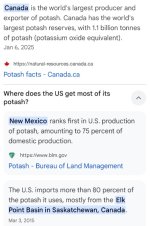
(Potash and phosphate are crucial crop nutrients: potash is a source of potassium that helps crops such as corn and soybeans increase their yield; phosphate rock provides plants with phosphorus. These two compounds, alongside nitrogen, are the foundation of modern fertilizers)
How much less potash can American farmers, gardeners, etc…use before it drops crop yields affecting profits and in turn wholesale & in turn retail food prices?
The US is currently pissy with Russia & Belarus, & China’s trying to feed its own 1.6 Billion mouths, & Israel is focussed on wars on many different fronts at this point, & that brings us down to the category of “others” countries far down the list. The alternatives to potash are few and far between (rare).
Where will (& should?) potash fit into this goat rodeo? If Canada produces 220 million tones of Potash annually, & exports 7 million tones of that the the US each year, then it’s already got a market for the other 97%-ish that it produces.
(Of the 9%-ish that America produced domestically, 75% of that came from New Mexico)
The global production annually of potash looks like this:


If US President Trump put a 25% tariff on potash, who are American Farmers going to get to replace that with so as not to have to pay the 25% tariff? Whomever is supplying the 11%-ish to America that Canada isn’t?

(Potash and phosphate are crucial crop nutrients: potash is a source of potassium that helps crops such as corn and soybeans increase their yield; phosphate rock provides plants with phosphorus. These two compounds, alongside nitrogen, are the foundation of modern fertilizers)
How much less potash can American farmers, gardeners, etc…use before it drops crop yields affecting profits and in turn wholesale & in turn retail food prices?
The US is currently pissy with Russia & Belarus, & China’s trying to feed its own 1.6 Billion mouths, & Israel is focussed on wars on many different fronts at this point, & that brings us down to the category of “others” countries far down the list. The alternatives to potash are few and far between (rare).
Where will (& should?) potash fit into this goat rodeo? If Canada produces 220 million tones of Potash annually, & exports 7 million tones of that the the US each year, then it’s already got a market for the other 97%-ish that it produces.
So here’s a weird one that might seem like background but really isn’t. In 2023, 91 percent of the potash used in the United States was imported from other countries, a slight increase compared to the previous year. Canada was the primary source of potash imports to the U.S. at that time.
(Of the 9%-ish that America produced domestically, 75% of that came from New Mexico)
The global production annually of potash looks like this:
View attachment 27184
View attachment 27185
If US President Trump put a 25% tariff on potash, who are American Farmers going to get to replace that with so as not to have to pay the 25% tariff? Whomever is supplying the 11%-ish to America that Canada isn’t?
View attachment 27186
(Potash and phosphate are crucial crop nutrients: potash is a source of potassium that helps crops such as corn and soybeans increase their yield; phosphate rock provides plants with phosphorus. These two compounds, alongside nitrogen, are the foundation of modern fertilizers)
How much less potash can American farmers, gardeners, etc…use before it drops crop yields affecting profits and in turn wholesale & in turn retail food prices?
The US is currently pissy with Russia & Belarus, & China’s trying to feed its own 1.6 Billion mouths, & Israel is focussed on wars on many different fronts at this point, & that brings us down to the category of “others” countries far down the list. The alternatives to potash are few and far between (rare).
Where will (& should?) potash fit into this goat rodeo? If Canada produces 220 million tones of Potash annually, & exports 7 million tones of that the the US each year, then it’s already got a market for the other 97%-ish that it produces.
Why arent investors bailing out?

No idea. Perhaps because the markets are closed, & Trump made it sound like Canadian oil might be exempt, until he didn’t? Trump suggested there would be a staggered rollout, telling reporters he will target Canadian oil and gas shipments with a lower 10 per cent tariff rate, setting a later date for implementation of Feb. 18.

 apple.news
Perhaps investors realize, tariffs or not, Canadian oil to the 70-ish American refineries tooled to refine it, can’t be retools towards a different grade quickly or sourced elsewhere immediately?
apple.news
Perhaps investors realize, tariffs or not, Canadian oil to the 70-ish American refineries tooled to refine it, can’t be retools towards a different grade quickly or sourced elsewhere immediately?
"We're not looking for a concession," Trump said, insisting that tariffs are a way for him to raise "big money" in revenue.
(So the Migrants & Fentanyl are/where just an excuse, and here we are?)
Anyway, Potash. Perhaps Canada’s Potash exports are sufficiently diversified to weather Trumps tariffs?
"You see the power of the tariff. I mean, the tariff is good, and nobody can compete with us, because we have by far the biggest piggy bank," he said.
The president warned he will "absolutely" soon impose tariffs on the European Union as well. Trump rejected suggestions that tariffs would trigger everyday prices to rise (?).
“Tariffs don't cause inflation. They cause success. They cause big success. So we're gonna have great success. There could be some temporary, short-term disruption,” he acknowledged, "and people will understand that." But he said in the long run, it would force other countries, such as those in Europe, to drop barriers to American imports like farm products.
Since the election, Trump has doubled down on his threat to impose a 25 per cent tariff on all goods from Canada and Mexico, announcing a deadline of 1 February. This could be aimed at curbing illegal migration and illicit drugs. Or it may have more to do with dismantlingthe free trade agreement that has covered North America for more than three decades. Either way, it is a brutal way for the United States to force concessions from its closest neighbours and biggest economic partners.

 www.lowyinstitute.org
Trump’s (& in turn America’s) Department of External Revenue to collect higher tariff revenues. Trump’s main economic advisers have expressed support. Treasury Secretary Scott Bessent defended a universal tariff of 10 per cent in his confirmation hearing. And Trump’s nominee to head the Council of Economic Advisors (a White House role) recently wrote a report arguing that an average tariff rate of 20 per cent (it was 3.3 per cent in 2023) would make the United States more prosperous.
www.lowyinstitute.org
Trump’s (& in turn America’s) Department of External Revenue to collect higher tariff revenues. Trump’s main economic advisers have expressed support. Treasury Secretary Scott Bessent defended a universal tariff of 10 per cent in his confirmation hearing. And Trump’s nominee to head the Council of Economic Advisors (a White House role) recently wrote a report arguing that an average tariff rate of 20 per cent (it was 3.3 per cent in 2023) would make the United States more prosperous.
A hidden risk for Australia’s exports is that of discrimination resulting from US trade deals with other countries. Trump’s memo directed the Office of the United States Trade Representative (USTR) to identify prospective countries with which the United States could negotiate bilateral or sectoral deals with the aim of securing market access for US exporters.
These deals will not be free trade agreements. We should be under no illusion that any “dirty deals” would be World Trade Organisation-compliant or that our free trade agreements would prevent them.
(I was just curious if Australia has also been directly threatened by Trump with tariffs so far, & “so far” it has not)
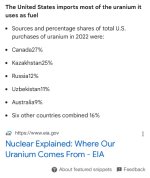
Donald Trump says U.S. tariffs on imports from Canada will begin Saturday — Toronto Star
U.S. President Donald Trump will act on his threat to levy 25 per cent tariffs on Canadian and Mexican products, says White House press secretary Karoline Leavitt.
"We're not looking for a concession," Trump said, insisting that tariffs are a way for him to raise "big money" in revenue.
(So the Migrants & Fentanyl are/where just an excuse, and here we are?)
Anyway, Potash. Perhaps Canada’s Potash exports are sufficiently diversified to weather Trumps tariffs?
"You see the power of the tariff. I mean, the tariff is good, and nobody can compete with us, because we have by far the biggest piggy bank," he said.
The president warned he will "absolutely" soon impose tariffs on the European Union as well. Trump rejected suggestions that tariffs would trigger everyday prices to rise (?).
“Tariffs don't cause inflation. They cause success. They cause big success. So we're gonna have great success. There could be some temporary, short-term disruption,” he acknowledged, "and people will understand that." But he said in the long run, it would force other countries, such as those in Europe, to drop barriers to American imports like farm products.
Since the election, Trump has doubled down on his threat to impose a 25 per cent tariff on all goods from Canada and Mexico, announcing a deadline of 1 February. This could be aimed at curbing illegal migration and illicit drugs. Or it may have more to do with dismantlingthe free trade agreement that has covered North America for more than three decades. Either way, it is a brutal way for the United States to force concessions from its closest neighbours and biggest economic partners.

Trump’s trade policy: Risks for Australia | Lowy Institute
With tariff threats against both friend and foe, regional trade agreements will assume greater importance.
A hidden risk for Australia’s exports is that of discrimination resulting from US trade deals with other countries. Trump’s memo directed the Office of the United States Trade Representative (USTR) to identify prospective countries with which the United States could negotiate bilateral or sectoral deals with the aim of securing market access for US exporters.
These deals will not be free trade agreements. We should be under no illusion that any “dirty deals” would be World Trade Organisation-compliant or that our free trade agreements would prevent them.
(I was just curious if Australia has also been directly threatened by Trump with tariffs so far, & “so far” it has not)

Specifically regarding potash? Please see Post# 243.Why arent investors bailing out?
Something along those lines?Where will (& should?) potash fit into this goat rodeo? If Canada produces 220 million tones of Potash annually, & exports 7 million tones of that the the US each year, then it’s already got a market for the other 97%-ish that it produces.
Or something along these lines?The US is currently pissy with Russia & Belarus, & China’s trying to feed its own 1.6 Billion mouths, & Israel is focussed on wars on many different fronts at this point, & that brings us down to the category of “others” countries far down the list. The alternatives to potash are few and far between (rare).
Something along this line? Some combination of these things?If US President Trump put a 25% tariff on potash, who are American Farmers going to get to replace that with so as not to have to pay the 25% tariff? Whomever is supplying the 11%-ish to America that Canada isn’t?
What Canada needs to do is shun the USA! Buy Canadian, let the USA tourist industry know that you are not going to USA, we hear that a lot of Canadians are selling their property’s in Florida, good show. If we can drop the tourists going to the USA by 30-50% it would be a bonus to our country, not so much to UASS.
Good luck . Let’s all winter in Yellowknife .What Canada needs to do is shun the USA! Buy Canadian, let the USA tourist industry know that you are not going to USA, we hear that a lot of Canadians are selling their property’s in Florida, good show. If we can drop the tourists going to the USA by 30-50% it would be a bonus to our country, not so much to UASS.
Or we could ya know, take our borders more seriously and end Canada being known as a drug source country for fentanyl and a haven for terrorists. But yeah, sticking it to the US is far more important isn't it.What Canada needs to do is shun the USA! Buy Canadian, let the USA tourist industry know that you are not going to USA, we hear that a lot of Canadians are selling their property’s in Florida, good show. If we can drop the tourists going to the USA by 30-50% it would be a bonus to our country, not so much to UASS.
And sure, Canada made some big busts recently but with the Fed putting a cap on prosecutions I'm betting anyone arrested in those raids is walking free right now.
This country has become a fucking joke.
Shutting off the oil taps is a fucking terrible idea and I'll explain why in 2 steps.
1) Shutting off the taps means we'd also have to shut down some wells. Shutting down wells is not optimal as it can take years to get them restarted.
2) Shutting down wells in the winter is particularly sub-optimal. Since we don't really have many other avenues of export OR customers, shutting off the taps would do significantly more harm to Canada than to the US in the long run.
1) Shutting off the taps means we'd also have to shut down some wells. Shutting down wells is not optimal as it can take years to get them restarted.
2) Shutting down wells in the winter is particularly sub-optimal. Since we don't really have many other avenues of export OR customers, shutting off the taps would do significantly more harm to Canada than to the US in the long run.
Become?Or we could ya know, take our borders more seriously and end Canada being known as a drug source country for fentanyl and a haven for terrorists. But yeah, sticking it to the US is far more important isn't it.
And sure, Canada made some big busts recently but with the Fed putting a cap on prosecutions I'm betting anyone arrested in those raids is walking free right now.
This country has become a fucking joke.
Here the Trump American Tariffs are explained in just over eight minutes:
(For Tec, YouTube & “Lawrence: No one else on the planet but Americans will ever pay a Trump tariff”)
…& this is what many politicians in Canada are salivating to also impose back onto Canadians that are already drowning in the last decade of Trudeau’s financial ineptitude? Good freak’n times…
The United States will impose punitive new tariffs on Canada and Mexico starting Saturday (=today), U.S. President Donald Trump said Friday, making good on repeated pledges to tax imports from his country’s biggest trading partners.
(for Tec, YouTube & “USMCA "a model trade deal:" Freeland on threat of tariffs from Trump government”)
Speaking from the Oval Office, Mr. Trump suggested there is nothing Canada could do to forestall the levies. “We’re not looking for a concession,” he said. “We’ll just see what happens.”…& that’s that.
Canadian Federal and provincial leaders have spent weeks preparing countermeasures, and outgoing lame duck Prime Minister Justin Trudeau on Friday said Canada is “ready with a response – a purposeful, forceful but reasonable, immediate response” to U.S. tariffs.
Discerning what exactly the White House wants has proven difficult. While Mr. Trump has raised fentanyl and migrants – neither of which come to the U.S. from Canada in large numbers – those around him have sought much larger gains.
Economist Peter Navarro is among those helping to draft the new White House approach to sanctions. He expects tariffs on foreign goods to cover the cost of running his country. Tariffs “will pay for a lot of government that we need to pay for and lower our taxes.”
So Americans will get to pay income taxes, & tariffs.
Canadians may get to pay income taxes, & a whole slew of carbon taxes, & if the current proposed retaliatory tariffs come into effect…the Canadians will pay Canadian imposed tariffs on top of that.

 apple.news
Canada would be wise to consider that Trump is using tariffs to inflict economic pain on Canadians, to weaken Canada and to renegotiate the United States-Mexico-Canada Agreement (NAFTA USMCA CUZMA EIEIO) with us from a position of strength later this spring.
apple.news
Canada would be wise to consider that Trump is using tariffs to inflict economic pain on Canadians, to weaken Canada and to renegotiate the United States-Mexico-Canada Agreement (NAFTA USMCA CUZMA EIEIO) with us from a position of strength later this spring.
 The Canadian/Quebec dairy supply management cartel & the Ontario slice of the auto industry will be focal points for Trump…like they were last time.
The Canadian/Quebec dairy supply management cartel & the Ontario slice of the auto industry will be focal points for Trump…like they were last time.
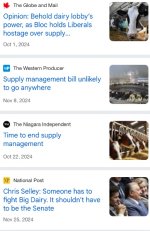
The below is from six years ago when the American focus was on Canadian Aluminum & Steel:
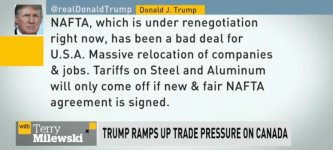
…& this is what many politicians in Canada are salivating to also impose back onto Canadians that are already drowning in the last decade of Trudeau’s financial ineptitude? Good freak’n times…
The United States will impose punitive new tariffs on Canada and Mexico starting Saturday (=today), U.S. President Donald Trump said Friday, making good on repeated pledges to tax imports from his country’s biggest trading partners.
Speaking from the Oval Office, Mr. Trump suggested there is nothing Canada could do to forestall the levies. “We’re not looking for a concession,” he said. “We’ll just see what happens.”…& that’s that.
Canadian Federal and provincial leaders have spent weeks preparing countermeasures, and outgoing lame duck Prime Minister Justin Trudeau on Friday said Canada is “ready with a response – a purposeful, forceful but reasonable, immediate response” to U.S. tariffs.
Discerning what exactly the White House wants has proven difficult. While Mr. Trump has raised fentanyl and migrants – neither of which come to the U.S. from Canada in large numbers – those around him have sought much larger gains.
Economist Peter Navarro is among those helping to draft the new White House approach to sanctions. He expects tariffs on foreign goods to cover the cost of running his country. Tariffs “will pay for a lot of government that we need to pay for and lower our taxes.”
So Americans will get to pay income taxes, & tariffs.
Canadians may get to pay income taxes, & a whole slew of carbon taxes, & if the current proposed retaliatory tariffs come into effect…the Canadians will pay Canadian imposed tariffs on top of that.
'Put sugar in the crude oil': Imagined Canadian retaliation strategies against Trump tariffs — National Post
From burning Americans' toast to having Ryan Reynolds say mean things, there is no shortage of unhinged ways Canada can respond to a tariff war
 The Canadian/Quebec dairy supply management cartel & the Ontario slice of the auto industry will be focal points for Trump…like they were last time.
The Canadian/Quebec dairy supply management cartel & the Ontario slice of the auto industry will be focal points for Trump…like they were last time.
The below is from six years ago when the American focus was on Canadian Aluminum & Steel:

If only their were a mechanism that works for all.Here the Trump American Tariffs are explained in just over eight minutes:
(For Tec, YouTube & “Lawrence: No one else on the planet but Americans will ever pay a Trump tariff”)
…& this is what many politicians in Canada are salivating to also impose back onto Canadians that are already drowning in the last decade of Trudeau’s financial ineptitude? Good freak’n times…
The United States will impose punitive new tariffs on Canada and Mexico starting Saturday (=today), U.S. President Donald Trump said Friday, making good on repeated pledges to tax imports from his country’s biggest trading partners.
(for Tec, YouTube & “USMCA "a model trade deal:" Freeland on threat of tariffs from Trump government”)
Speaking from the Oval Office, Mr. Trump suggested there is nothing Canada could do to forestall the levies. “We’re not looking for a concession,” he said. “We’ll just see what happens.”…& that’s that.
Canadian Federal and provincial leaders have spent weeks preparing countermeasures, and outgoing lame duck Prime Minister Justin Trudeau on Friday said Canada is “ready with a response – a purposeful, forceful but reasonable, immediate response” to U.S. tariffs.
Discerning what exactly the White House wants has proven difficult. While Mr. Trump has raised fentanyl and migrants – neither of which come to the U.S. from Canada in large numbers – those around him have sought much larger gains.
Economist Peter Navarro is among those helping to draft the new White House approach to sanctions. He expects tariffs on foreign goods to cover the cost of running his country. Tariffs “will pay for a lot of government that we need to pay for and lower our taxes.”
So Americans with get to pay income taxes, & tariffs.
Canadians may get to pay income taxes, & a whole slew of carbon taxes, & if the current proposed retaliatory tariffs come into effect…the Canadians will pay Canadian imposed tariffs on top of that.
Canada would be wise to consider that Trump is using tariffs to inflict economic pain on Canadians, to weaken Canada and to renegotiate the United States-Mexico-Canada Agreement (NAFTA USMCA CUZMA EIEIO) with us from a position of strength later this spring.
'Put sugar in the crude oil': Imagined Canadian retaliation strategies against Trump tariffs — National Post
From burning Americans' toast to having Ryan Reynolds say mean things, there is no shortage of unhinged ways Canada can respond to a tariff warapple.news
View attachment 27194The Canadian/Quebec dairy supply management cartel & the Ontario slice of the auto industry will be focal points for Trump…like they were last time.
View attachment 27196
The below is from six years ago when the American focus was on Canadian Aluminum & Steel:
View attachment 27197
On a Saturday...when do they take effect?
tuesday. see above link.On a Saturday...when do they take effect?